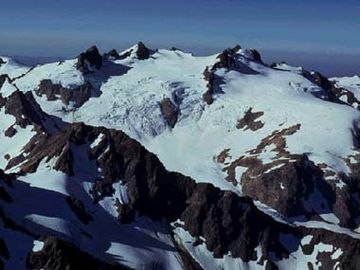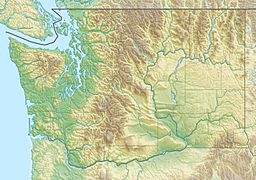Mount Olympus (Washington) facts for kids
Quick facts for kids Mount Olympus |
|
|---|---|
 |
|
| Highest point | |
| Elevation | 7,980 ft (2,430 m) NAVD 88 |
| Prominence | 7,838 ft (2,389 m) |
| Listing |
|
| Geography | |
| Location | Olympic National Park, Jefferson County, Washington, US |
| Parent range | Olympic Mountains |
| Topo map | USGS Mount Olympus |
| Geology | |
| Age of rock | Eocene |
| Mountain type | Shale and sandstone |
| Climbing | |
| First ascent | 1907 by L.A. Nelson and party |
| Easiest route | Glacier Climb |
Mount Olympus is a very tall mountain in the Olympic Mountains range. It stands at about 7,980 feet (2,430 m) high. This makes it the tallest and most important mountain in the state of Washington, USA.
You can find Mount Olympus on the Olympic Peninsula. It is a main part of Olympic National Park. Even though it's the highest peak, other mountains like Mount Constance are more famous. This is because people in Seattle can see them easily.
About Mount Olympus
Mount Olympus rises very steeply from the land around it. It climbs over 2,100 m (6,900 ft) from the Hoh River in just 8.8 km (5.5 mi). This mountain is the 5th most "prominent" peak in Washington state. Prominence means how much a mountain stands out from the land around it.
Because of lots of snow in winter, Mount Olympus has many large glaciers. This is true even though it's not super high up and not very far north. Some of its glaciers are called Blue, Hoh, Humes, Jeffers, Hubert, Black, and White. The Hoh Glacier is the longest, at 3.06 miles (4.93 km). The Blue Glacier is the biggest.
Like most glaciers in warmer areas, these glaciers are getting smaller. Their size and amount of ice have been shrinking in recent years.
History of Mount Olympus
Native American people, like the Duwamish, had their own names for these mountains. One name was Sunh-a-do.
A Spanish explorer named Juan Pérez saw the mountain in 1774. He called it Cerro Nevado de Santa Rosalía, which means "Snowy Peak of Saint Rosalia". This was the first time a European gave a name to a place in what is now Washington state.
Later, on July 4, 1788, a British explorer named John Meares gave the mountain its current name: Mount Olympus.
In 1890, a group led by US Army officer Joseph P. O'Neil reached the top. They likely climbed the southern peak, which is called Athena today.
Mount Olympus became a special protected area in 1909. President Theodore Roosevelt made it the Mount Olympus National Monument. Later, in 1938, President Franklin D. Roosevelt made it a full national park.
Over the years, the park gained more special titles:
- In 1976, it became an International Biosphere Reserve. This means it's a special place for nature and people.
- In 1981, it was named a World Heritage Site. This means it's important to everyone on Earth.
- In 1988, most of the park became the Olympic Wilderness. This protects its wild nature even more.
Weather at Mount Olympus
The top of Mount Olympus has a cold, windy climate called a tundra climate (ET). It gets a lot of rain and snow, especially from October to April. Even in summer, from May to September, it still gets a lot of wet weather. Much of this wet weather falls as snow.
| Climate data for Mount Olympus 47.7997 N, 123.7080 W, Elevation: 7,448 ft (2,270 m) (1991–2020 normals) | |||||||||||||
|---|---|---|---|---|---|---|---|---|---|---|---|---|---|
| Month | Jan | Feb | Mar | Apr | May | Jun | Jul | Aug | Sep | Oct | Nov | Dec | Year |
| Mean daily maximum °F (°C) | 29.1 (−1.6) |
28.6 (−1.9) |
28.7 (−1.8) |
32.6 (0.3) |
40.8 (4.9) |
46.7 (8.2) |
56.5 (13.6) |
57.0 (13.9) |
52.5 (11.4) |
42.5 (5.8) |
31.7 (−0.2) |
27.6 (−2.4) |
39.5 (4.2) |
| Daily mean °F (°C) | 24.6 (−4.1) |
22.8 (−5.1) |
22.2 (−5.4) |
25.2 (−3.8) |
32.6 (0.3) |
37.9 (3.3) |
46.6 (8.1) |
47.3 (8.5) |
43.2 (6.2) |
34.9 (1.6) |
26.6 (−3.0) |
23.2 (−4.9) |
32.3 (0.1) |
| Mean daily minimum °F (°C) | 20.0 (−6.7) |
17.0 (−8.3) |
15.8 (−9.0) |
17.7 (−7.9) |
24.3 (−4.3) |
29.1 (−1.6) |
36.6 (2.6) |
37.5 (3.1) |
34.0 (1.1) |
27.4 (−2.6) |
21.6 (−5.8) |
18.8 (−7.3) |
25.0 (−3.9) |
| Average precipitation inches (mm) | 27.23 (692) |
28.53 (725) |
28.75 (730) |
13.32 (338) |
12.58 (320) |
8.99 (228) |
3.63 (92) |
6.59 (167) |
10.95 (278) |
16.12 (409) |
49.13 (1,248) |
26.46 (672) |
232.28 (5,899) |
| Average snowfall inches (cm) | 98.7 (251) |
94.6 (240) |
89.6 (228) |
50.5 (128) |
18.1 (46) |
5.6 (14) |
0.3 (0.76) |
0.0 (0.0) |
3.4 (8.6) |
24.1 (61) |
100.9 (256) |
98.0 (249) |
583.8 (1,482.36) |
| Average precipitation days (≥ 0.01 in) | 20 | 21 | 19 | 17 | 13 | 11 | 6 | 5 | 9 | 15 | 21 | 20 | 177 |
| Source: PRISM Climate Group | |||||||||||||
| Climate data for Mt Olympus west peak | |||||||||||||
|---|---|---|---|---|---|---|---|---|---|---|---|---|---|
| Month | Jan | Feb | Mar | Apr | May | Jun | Jul | Aug | Sep | Oct | Nov | Dec | Year |
| Mean daily maximum °F (°C) | 28.6 (−1.9) |
30.0 (−1.1) |
32.6 (0.3) |
37.7 (3.2) |
43.4 (6.3) |
48.8 (9.3) |
56.1 (13.4) |
57.5 (14.2) |
52.9 (11.6) |
41.8 (5.4) |
32.7 (0.4) |
28.4 (−2.0) |
40.9 (4.9) |
| Daily mean °F (°C) | 24.0 (−4.4) |
24.5 (−4.2) |
25.4 (−3.7) |
29.5 (−1.4) |
35.1 (1.7) |
41.0 (5.0) |
47.6 (8.7) |
48.6 (9.2) |
44.6 (7.0) |
35.3 (1.8) |
27.6 (−2.4) |
23.6 (−4.7) |
33.9 (1.1) |
| Mean daily minimum °F (°C) | 19.4 (−7.0) |
19.1 (−7.2) |
18.2 (−7.7) |
21.3 (−5.9) |
26.7 (−2.9) |
33.2 (0.7) |
39.0 (3.9) |
39.6 (4.2) |
36.3 (2.4) |
28.9 (−1.7) |
22.6 (−5.2) |
18.9 (−7.3) |
26.9 (−2.8) |
| Average precipitation inches (mm) | 41.66 (1,058) |
26.00 (660) |
27.73 (704) |
21.70 (551) |
11.16 (283) |
9.97 (253) |
4.72 (120) |
5.81 (148) |
8.82 (224) |
22.81 (579) |
39.49 (1,003) |
39.25 (997) |
259.12 (6,580) |
See also
 In Spanish: Monte Olympus (Washington) para niños
In Spanish: Monte Olympus (Washington) para niños
 | Misty Copeland |
 | Raven Wilkinson |
 | Debra Austin |
 | Aesha Ash |


